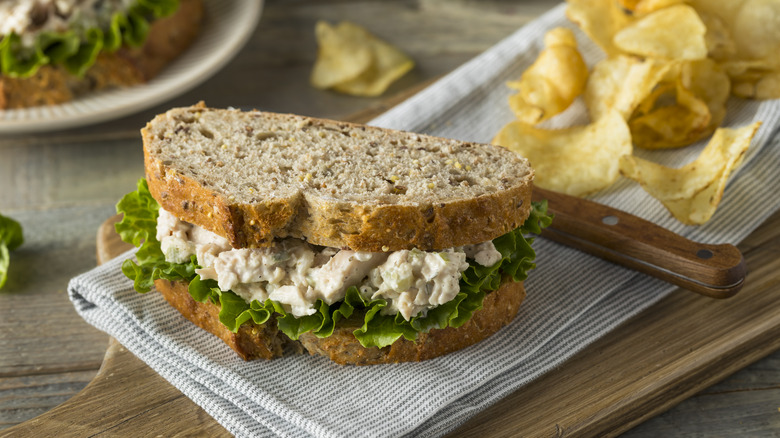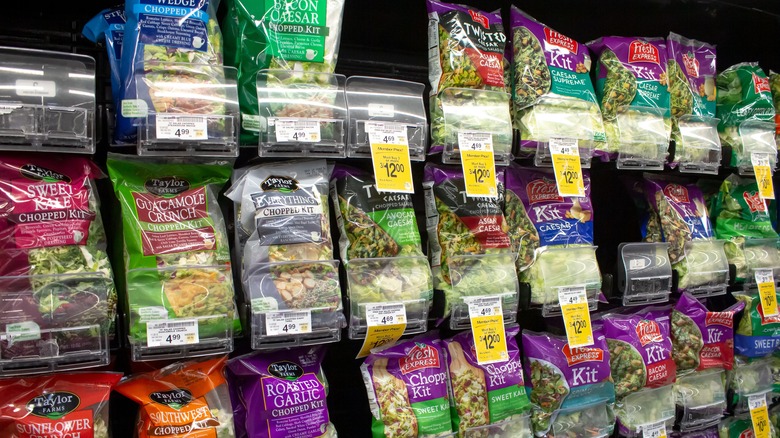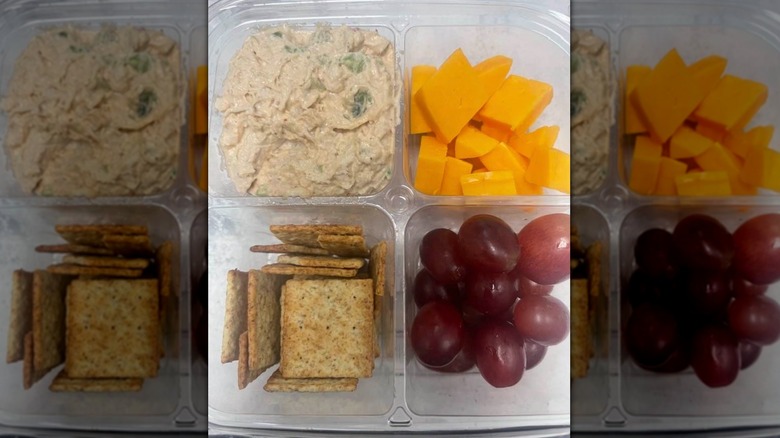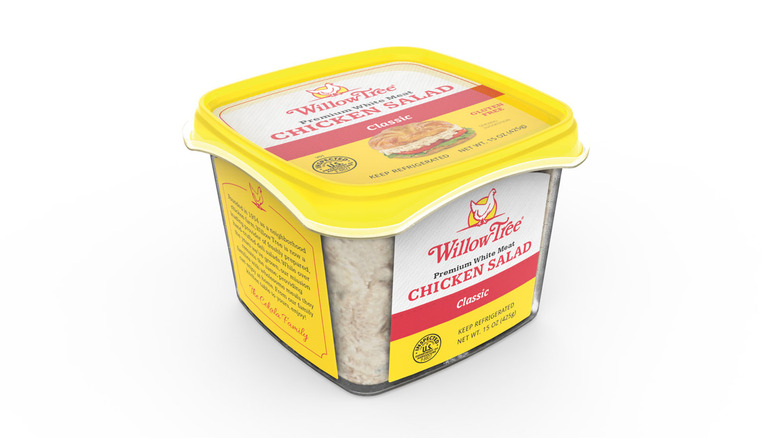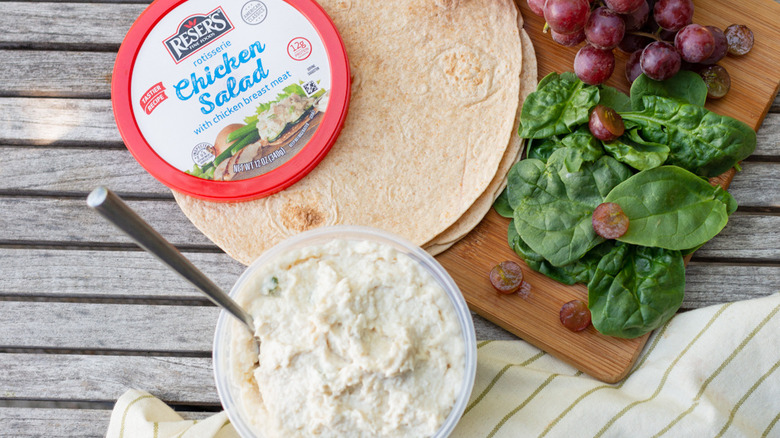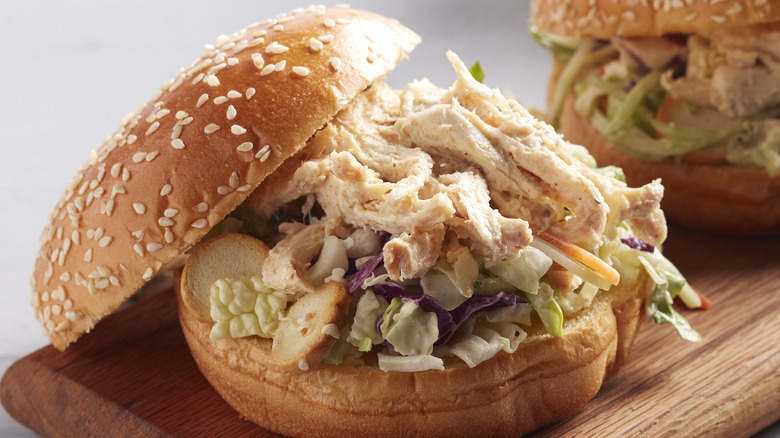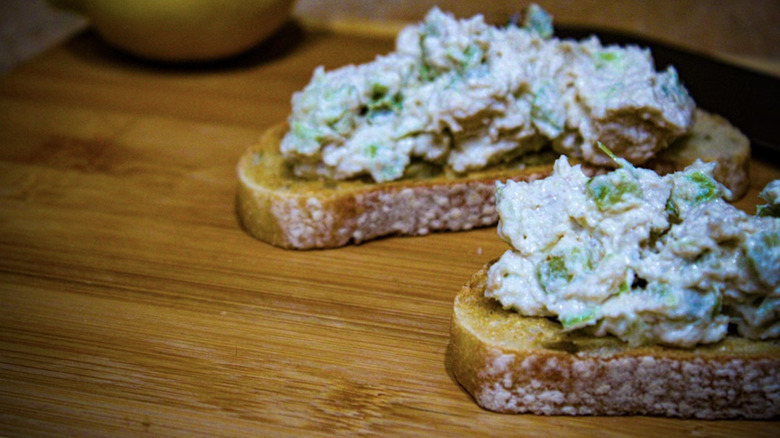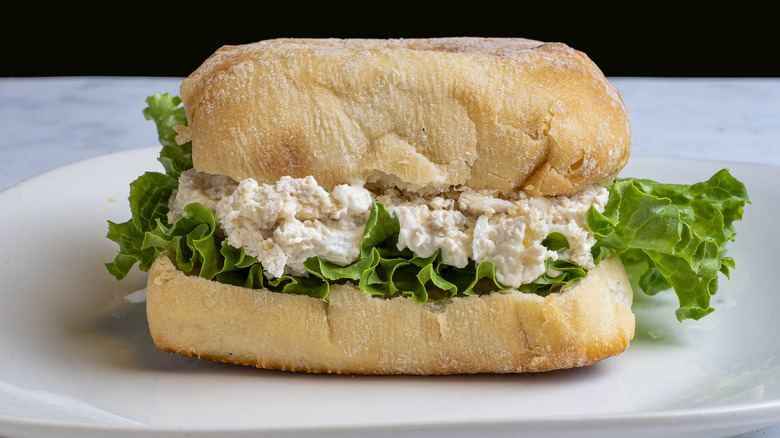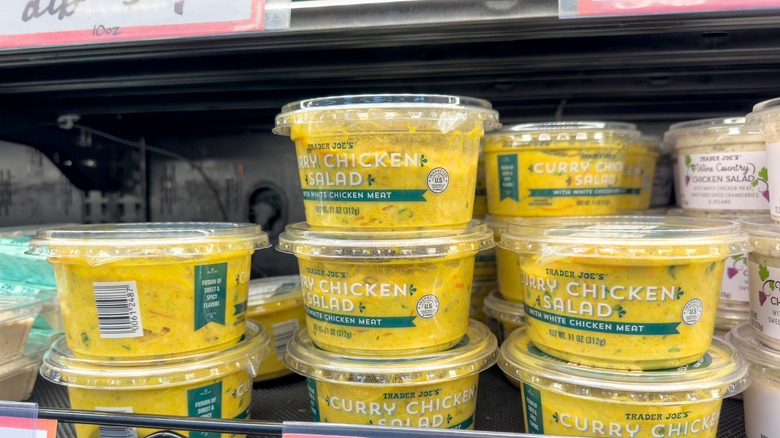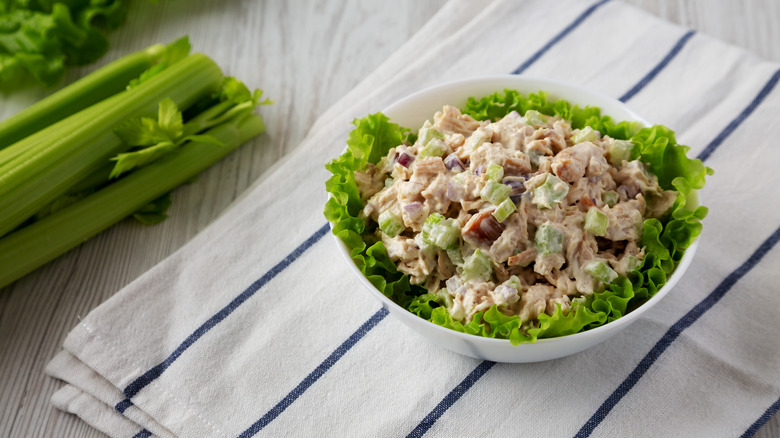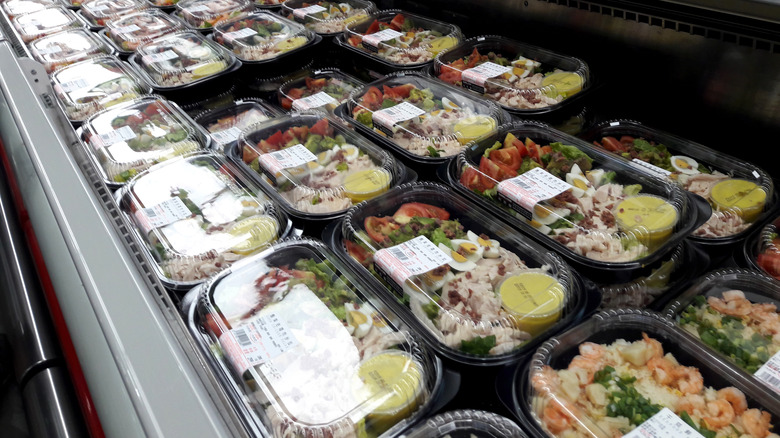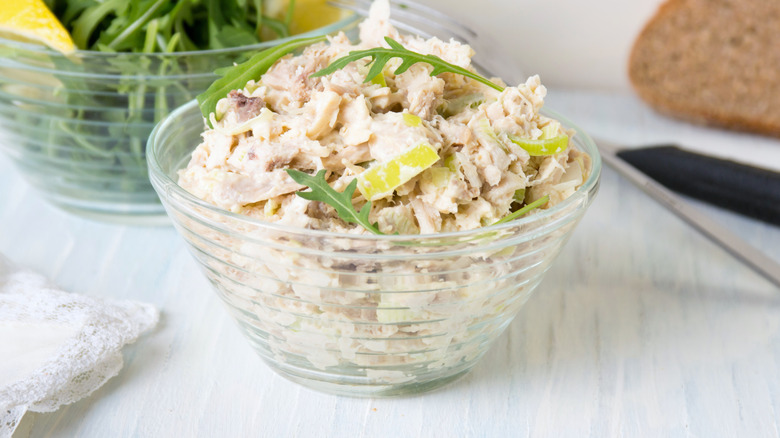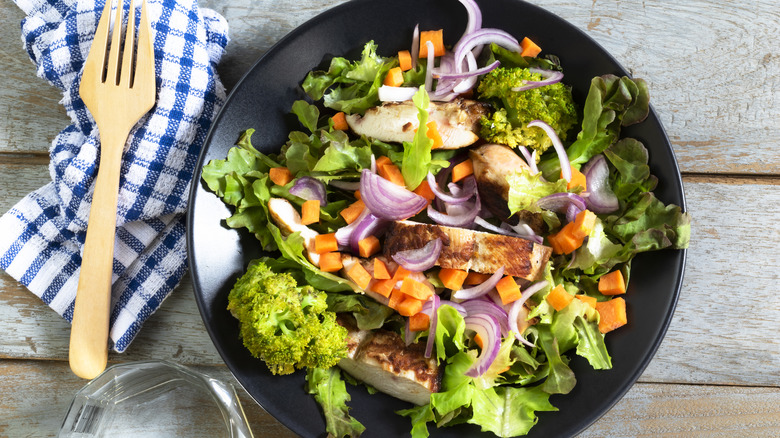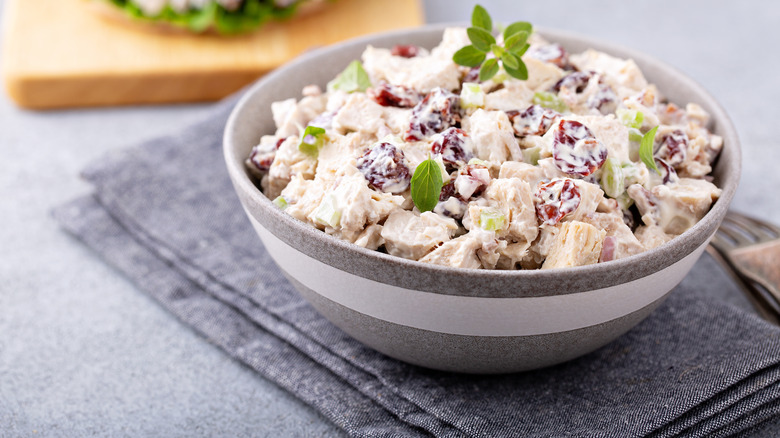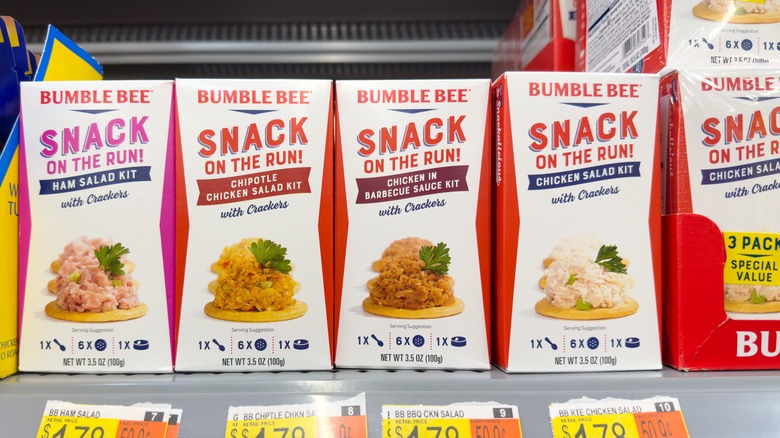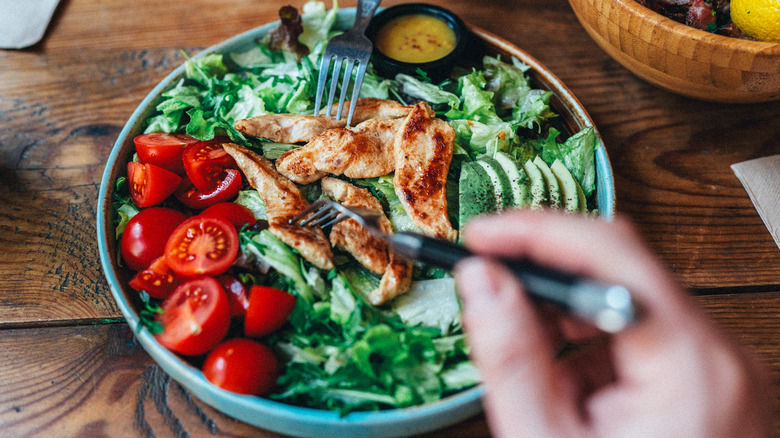The 15 Biggest Chicken Salad Recalls That Affected Shoppers
If you're craving a chicken dish that's pretty much the culinary equivalent of a white T-shirt, you can't go wrong with a hearty chicken salad. Tuck it into toast for a no-fuss breakfast, roll it into a tortilla for the perfect grab-and-go lunch, or pile it onto a cracker for a crowd-pleasing party app.
That said, it's probably best not to make "whenever, wherever" your mantra when it comes to chicken salad. Chicken itself is notoriously prone to contamination, with chicken recalls linked to contaminants like listeria and salmonella being tied to some pretty disastrous disease outbreaks over the years. And that's before you even factor in the add-ons — celery, mayo, onions — all of which have spurred some pretty massive recalls of their own. So, of course, a meal that packs all of these ingredients is likely to have been placed under recall a bunch of times. Below is a roundup of some of the worst reasons chicken salad ended up getting pulled from commerce, spanning everything from listeria to undeclared sodium benzoate.
Taylor Farms Pacific, Inc. (2024)
If there's one firm that's pretty much got the bagged salad market cornered, it's Taylor Farms Pacific, Inc. Sure, it made that dubious Ultimate Wedge Salad Kit that's basically just shredded lettuce in a bag. But every now and then, it actually outdoes itself, like with Kroger's Apple Walnut with Chicken Salad Kit, a chicken salad that puts the 'add' in add-ons. Bleu cheese, walnuts, apple, carrots, cranberries, every lettuce ever; you name it, it's probably in there.
The bad news is that this salad's pretty much teeming with known allergens. Soy, nuts, soybean, wheat; it's like severe anaphylaxis in a bag. And considering the sheer number of Americans with a diagnosed food allergy, this sounds like information that should be prominently displayed on the product packaging. Except sometimes Taylor Farms just forgets. One of those times was March 2024, when the company shipped a batch the salad to Kroger stores across multiple states — including Utah, Wyoming, Oregon, Washington, and California — without declaring wheat on the label. About 19,976 pounds were placed under recall, 5,941 pounds of which were eventually retrieved from commerce.
LSG Sky Chefs (2021)
There's a very real risk of coming down with listeriosis from practically anything you put on your dinner table. The risk is that much greater with chicken salad, which is basically a collation of ingredients from multiple sources, all of which can and have been subject to recall. In 2021, the culprit happened to be a batch of ready-to-eat chicken products produced by Missouri-based Tyson Foods Inc. An estimated 8,955,296 pounds of the tainted chicken were pulled from institutions across the country, but not before it caused a multi-state listeriosis outbreak that sickened three people and left one dead.
That wasn't the end of it, though. A bunch of downstream producers were swept up in the recall, one of which was airline catering giant LSG Sky Chefs, which had to pull back Circle K brand chicken salad sandwiches distributed to Circle K stores in Arizona, Phoenix, and California. Also caught in the mire was grocery store chain H-E-B, which ended up yanking an undisclosed amount of H-E-B Meal Simple chicken salads spanning four categories (alongside multiple other chicken products) from its shelves.
Willow Tree Farm (2021)
Whether you're reheating your leftovers in "microwave-safe" plastic containers or merely chopping veggies on a plastic cutting board, plastic contamination is pretty much unavoidable. The risk is much greater inside a food processing plant teeming with machinery made partly — if not entirely — of plastic.
And if you need a real-world exemplar of this, take the case of Willow Tree Farm. In 2021, the Massachusetts-based company found itself recalling an estimated 52,022 pounds of Willow Tree brand chicken salads and dips from wholesale and retail outlets across multiple states, including New York, Rhode Island, Vermont, Connecticut, and Maine over plastic contamination.
Willow Tree became aware of the issue after receiving complaints from customers who'd found hard bits of plastic in their chicken products. In an email statement, Willow Tree president Walter Cekala chalked the issue up to a defective food-grade plastic bearing. While he noted that 90% of the faulty part had been traced, Willow Tree still issued the recall "out of an abundance of caution," per NBC News.
Jumbo Foods, Inc. & Reser's Fine Foods (2019)
With the food industry supply chain being as interconnected as it is, it's not uncommon for one innocuous upstream problem to ripple through the system, sparking multiple recalls. Health officials are usually able to trace the culprit supplier fairly quickly. But sometimes supply lines crisscross in such complex ways that it's virtually impossible to pin down a definitive source. That's exactly what happened in 2019, when health officials began investigating an international listeriosis outbreak that had caused 31 illnesses, 22 hospitalizations, and two deaths in the United States and Canada. Genetic testing found similar strains in diced chicken products from over a dozen Canadian and American companies, sparking more than a dozen recalls.
Among those caught in the mire was Georgia-based Tip Top Poultry, which recalled an unspecified amount of ready-to-eat chicken products spanning an array of brands, including Sysco, Perdue, and Butterball. Unfortunately, the recall came long after the products had made rounds in Tip Top's downstream supply lines. Bearing the brunt of the ensuing fallout was Jumbo Foods, Inc. of Washington state, which had used Tip Top chicken to make its Tuscan Sun brand chicken salad sandwiches.
With Tip Top chicken under recall, Jumbo Foods had no choice but to yank 69,417 pounds of sandwiches from commerce. Also caught in the spillover was Oregon-based Reser's Fine Foods Inc., which pulled an unspecified amount of chicken salad spanning four categories from retailer stores nationwide. Although health officials suspected that the contamination likely originated from a shared upstream supplier, they did not find any obvious links between the tainted products beyond carrying genetically compatible listeria strains.
Triple T Specialty Meats, Inc. (2018)
If bagged salad doesn't quite hit the convenience sweet spot for you, there's always deli salad. It's so convenient you could actually start chowing down on it right out the store door. There are a few caveats, though; the first being that deli counter salad safety doesn't always run parallel to convenience. Deli counter salads have been subject to a number of massive recalls over the years, the nastiest of which happened in 2018, when 265 people across eight states sickened after eating chicken salad sourced from Fareway. By the time health officials traced the illnesses to Iowa-based Triple T Specialty Meats Inc., 94 people had been hospitalized and one had died.
Triple T yanked 20,630 pounds of the tainted chicken salad from Fareway stores in multiple Midwestern states, including Iowa, Minnesota, South Dakota, Nebraska, and Illinois. That wasn't the end of it, though. Triple T and Fareway were later hit with more than four dozen lawsuits by outraged customers, all of which were later settled for undisclosed amounts. Triple T also faced reprisals from Fareway, which not only filed its own lawsuit but also terminated its business dealings with the company altogether.
Packer Avenue Foods (2017)
Despite prevailing misconceptions, food allergies are a pretty serious public health problem. The CDC estimates that about 6.2% of American adults have a food allergy, which is why declaring known allergens on product packaging is a non-negotiable in the food industry. And while recalls over pathogens like salmonella, listeria, and E. coli usually hog the headlines, labeling oversights involving allergens have sparked some pretty massive recalls of their own; felling everything from Lay's potato chips to Kirkland Signature butter.
None of those, however, can hope to hold a candle to the veritable avalanche of recalls that ensued in 2017, when an unknown upstream breadcrumb supplier for multiple meat and poultry heavy hitters failed to declare milk. Nearly a dozen companies and over three million pounds of food products were swept up in the recall. Chicken salad took a relatively minimal hit. Pennsylvania-based Packer Avenue Foods — one of two chicken-salad makers in the ilk — recalled 9,690 pounds of ready-to-eat Mainstream and Packer Avenue Foods brand Chicken Salad with White Meat Chicken from retailers in Delaware, Maryland, New Jersey, Pennsylvania, and Virginia.
Aldon Food Corporation (2017)
Chicken salad isn't one of those ingredients that'll demand you empty half your fridge into a bowl to make it just right. Sure, a basic chicken salad recipe calls for nearly a dozen ingredients, but if your pantry's running on fumes, you can still whip one up with just onions, celery, mayo, and shredded chicken. And if you're scraping the bottom of the barrel on those, too, try tossing in a handful of breadcrumbs for a little bulk. It's such a quick and efficient trick to stretching out a salad that a lot — if not all — commercial salad makers use it.
But it's not always such a good idea to add more ingredients to your chicken salad. Chicken, onions, celery, and even mayo have all landed on the recall list multiple times, so there's already a pretty huge chance of tainting a basic chicken salad. Adding more ingredients just widens the margin of error. That's how not one, but two chicken salad makers found themselves pulling back massive amounts of product after Newly Weds Foods, an upstream supplier of crackers and breadcrumbs, failed to declare milk in its products in June 2017. This particular lot of products had been distributed to retailers across Delaware, Connecticut, Massachusetts, Maryland, New Jersey, Pennsylvania, Ohio, New York, and Virginia under an array of brand names, including Block & Barrel Imperial, Don's Salads, Market Source, and Hymie's.
Green Cuisine (2017)
Everybody's walked into Trader Joe's and found one of their designated pantry must-haves missing from the shelves. Some Trader Joe's items disappear so fast you'll only ever hear about them via rumors. But things don't go scarce at TJ's solely because of high demand. The chain has weathered a number of massive recalls over the years. Sure, nothing will likely ever match the broccoli cheddar soup recall of 2023 in terms of sheer grossness, but there have been some doozies.
One of the worst, at least with regard to chicken salad, came in 2017 after customers called in complaining about finding hard foreign objects in store-brand turkey and chicken salads. The said foreign objects were later identified as silica and glass, forcing the chain to yank an estimated 65,621 pounds of salad produced by California-based Green Cuisine from stores across multiple states, including Texas, Arizona, Idaho, Colorado, and Louisiana.
Reser's Fine Foods (2013)
Aside from storing your chicken salad too long in the fridge, skipping a proper countertop wipe-through between tasks is one of those meal prep mistakes that's dangerously easy to make. And while fate is mostly forgiving, sometimes harsh consequences follow. Kansas-based Reser's Fine Foods got a brutal crash course in this in 2013 after testing by the Canadian Food Inspection Agency turned up Listeria in batches of beef, ham, and chicken products — mostly chicken salad — produced at its Topeka plant and distributed under multiple brand names, including Walmart, Yoder, Kroger, Block & Barrel, Miller's, and Everyday Essentials.
FDA investigators later conducted inspections at the plant, concluding that the issue was likely brought about by cross-contamination of products via shared surfaces. Although no illnesses were reported, Reser's still had to yank 109,000 cases of the tainted products from retail stores across multiple states, including Florida, Virginia, Kentucky, Texas, Nebraska, Michigan, and Arkansas.
Costco (2013)
Cooking the chicken is pretty much all the heavy lifting you'll need to do before making a chicken salad. But it doesn't have to be, not when rotisserie chicken goes for a measly $4.99 at Costco. Costco seems to have cracked that code too, spinning those rotisserie birds into an array of secondary products, including soups and salads. Unfortunately, that means that if the chicken somehow gets tainted, a bunch of inventory can come tumbling down with it.
That's exactly what happened in December 2013. Costco sourced a batch of chicken from Foster Farms, a California-based producer whose birds were later tied to a multi-state Salmonella outbreak that sickened 634 people in 29 states. Although Costco cooked its rotisserie chickens to USDA standards, the salmonella survived. The wholesale giant was consequently yanked 101,764 pounds of rotisserie chickens and spin-off products — including chicken salad — from its 1600 El Camino Real outlet.
Boston Salads & Provisions Company, Inc. (2013)
There's a reason why health officials take Listeria-related recalls seriously enough to designate them Class One. Listeria has caused a number of catastrophic recalls over the years, including Pilgrim's Pride recall of 2002, which caused 46 illnesses and seven deaths across eight states in addition to wiping over 20 million pounds of ready-to eat chicken and turkey products off the shelves.
Pilgrim's Pride isn't alone. Many chicken salad companies have felt the pinch of a listeria recall over the years, but none to date has felt it worse than Massachusetts-based Boston Salads & Provisions Company, Inc. Things started going south in late October 2013 when testing by the New Hampshire Department of Public Health found listeria in two samples of ready-to-eat Rachel's Gourmet chicken salads produced by the company. The FSIS was notified, prompting the company to recall 222,959 pounds of chicken salads spanning five categories from retailers across Massachusetts and New Hampshire.
Garden Fresh Foods (2012)
Celery and mayo are essential to a run-of-the-mill chicken salad, but they're pretty much useless without something to add just a bit of bite and brightness. That's where diced onions come in. You really can't do without them; unless, of course, you want a heavy, bland chicken salad that lingers a bit too long on the palate (or find a worthy substitute like pickles).
But the quest for that oniony zing can sometimes be perilous. Wisconsin-based Garden Fresh Foods learned this the hard way in 2012 after procuring a batch of diced onions from Gills Onions of Oxnard, California. Those onions were later found to be contaminated with Listeria, sparking an almost industry-wide recall that swept up more than a dozen companies. Although the exact cumulative toll was never made public, Garden Fresh alone ended up yanking about 13,600 pounds of Weis, Market Pantry, Finest Traditions, and Garden Fresh chicken salad products spanning nearly a dozen categories.
Allison's Gourmet Kitchens, Inc. (2011)
Chicken salad really isn't a complex dish. You can pretty much do a finger count of all the ingredients you need to make it: Celery, onions, mayo, maybe a rogue cucumber to crank up the crunch. The same can't be said for store-bought versions. Sure, they'll pack in the basics, but more often than not, there's something in there you'd probably only encounter in a chemistry textbook.
And while some additives are relatively safe at threshold levels, plenty have been linked to some pretty grave health risks. That's why regulators mandate that common additives — think FD&C dyes, preservatives, artificial sweeteners, antioxidants, and leavening agents — be clearly declared on packaging. Of course, mix-ups do happen. And when they do, a sweeping recall often follows.
This is exactly what Allison's Gourmet Kitchens, Inc. found itself grappling with in 2011. The Oklahoma-based company was forced to yank Hill County Fare, Baker's Kitchen, and Allison's Gourmet Kitchens brand chicken and ham salads distributed to retailers and institutions across nine states over undeclared potassium sorbate and sodium benzoate. Potassium sorbate is generally regarded as safe, provided your intake doesn't exceed the daily 3 milligram (per each kilogram of body weight) threshold. Sodium benzoate, on the other hand, has been tied to a laundry list of health issues, including allergic reactions, inflammation, and even childhood ADHD.
The Suter Company, Inc. (2010)
Pre-made salad is a foolproof hack to getting your chicken salad fix without making a complete mess of your kitchen counter. Heck, some pre-made salads might even taste better than anything you could ever whip up at home. But you never really know what mysteries lurk inside a salad you didn't make yourself. It might be swimming in goopy mayo, brimming with raisins (who asked for that?), or worse, adulterated with foreign objects like plastic.
That's exactly what fans of Bumble Bee label Lunch on the Run Chicken Salad Complete Lunch Kit and Chicken Salad with Crackers found themselves dealing with after The Sutter Company, Inc, the Illinois-based company behind the canned salads, shipped a batch of them to commerce peppered with hard bits of plastic. Multiple customers called in with complaints, prompting the company to recall a whopping 72,000 pounds of the stuff from retailers across the country.
Sandridge Food Corp. (2006)
Chicken salad is right up there with rice paper rolls in terms of meal prep friendliness. If you've already got your chicken cooked and ready, you can whip one up without even turning on a single kitchen appliance. But sometimes you really can't be arsed to mix four ingredients in a bowl. That's when the store-bought tubs come in; no fuss, no mess, and practically zero energy spent.
One thing to keep in mind, though: Pre-made chicken salad isn't made with your specific quirks in mind. That's why it's best to give the ingredients list a quick once-over before tossing one into your cart, else you might end up taking in something to which you're deathly allergic. Though that might not have helped much if you happened to buy Grandma's Original Recipes chicken salad in 2006. Despite containing soy, this product was sent out to commerce sans the legally mandated label. As a result, Sandridge Food Corp., the Ohio-based company behind the chicken salad, was forced to pull 7,497 pounds of the stuff from retailers across Ohio, Florida, New York, and Pennsylvania.

